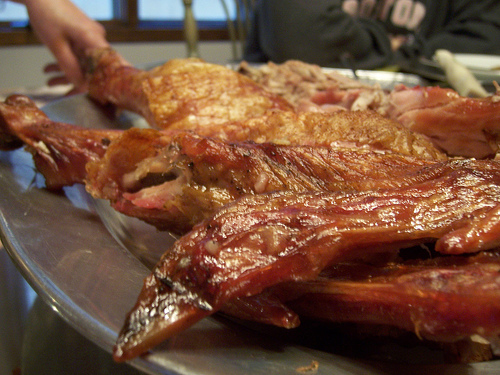By Karen Aney (The Cascade) – Email
Print Edition: December 6, 2011
Tryptophan is an amino acid. It’s one of 20 standard amino acids, and is essential to the human diet. It’s perhaps best known outside of the science world for being the stuff that’s in turkey that makes us sleepy – but is that really true?
First, to clarify, tryptophan does make you sleepy, and turkey does have tryptophan in it. It’s a fairly good source, too: one serving has approximately 0.25-0.30 grams, according to Health Canada. However, it’s nothing special. Chicken actually tends to have 0.3 or 0.4 more grams of tryptophan than turkey does – and chicken is a common part of most North American diets. If you’re looking for something with even more tryptophan, check out parmesan cheese, soybeans, or caribou – all have between 0.40 and 0.60 grams of tryptophan per serving.
So why are we all so sleepy after a big Christmas bird? Logic suggests that it’s probably more to do with the carbohydrates. Stuffing, mashed potatoes, biscuits – these are all foods rich in carbohydrates, which will tire your body out during the digestion process. There is some validity to the turkey-dinner-makes-you-sleepy claim, but only because the dense servings of carbohydrates actually help the tryptophan to do its job pretty well; foods that are high in carbohydrates cause the pancreas to excrete extra insulin into the bloodstream. This helps clear it of any amino acids that are hanging around – like tryptophan.
Essentially, tryptophan makes you sleepy because it calms you down. The serotonin and melatonin in your body are actually derived from tryptophan – it’s the “c’mon get happy” amino acid. Because of this, a practical application of tryptophan is actually more as an anti-depressant than a sleep aid. Most often in Canada, it is prescribed as such: either tryptophan is given to patients as a stand-alone anti-depressant or general anti-anxiety medication, or it’s prescribed as a natural supplement to serotonin and melatonin boosting drugs.
Tryptophan is legal in Canada, though the United States has alternated between banning it all together and ruling that it may be administered by doctors. Currently, tryptophan can only be obtained in Canada with a prescription. However, because it is a naturally occurring substance and our bodies do need it to function, finding a doctor to prescribe it for you isn’t all that difficult. As recently as 2008, the company “Life Choice” has been fined for producing tryptophan in 500 mg capsules for general public consumption. In other words, check supplement stores if you’d like it without a prescription – it’s out there.
One final suggestion from nutritionists is that it’s advantageous to eat turkey on an empty stomach. Linda Yerardi, a nutritionist from Maryland, claims this is the only way to let it function in your body. “You’d have to take L-tryptophan alone (with no other amino acids present) and on an empty stomach to produce any drowsiness,” she explains on eatingwell.com. There’s some validity to this statement: while it’s true that carbohydrates help the body absorb amino acids, the idea that tryptophan is best absorbed without other acids to fight again is valid as well.
So, if you’re feeling bummed this Christmas because Santa didn’t bring you a jump drive of completed essays for next semester, try eating some turkey. Better yet, bust out a hunk of parmesan cheese. If you’re having trouble sleeping, skip the warm milk and try a piece of cold turkey. If nothing else, it might prolong that Christmas joy just a little bit longer.


